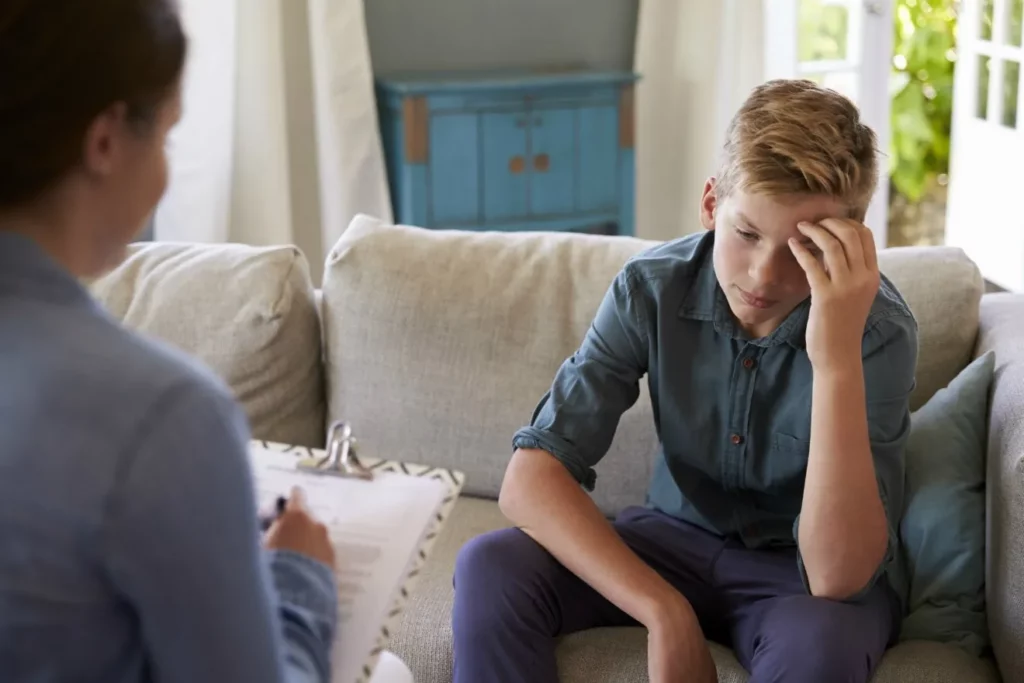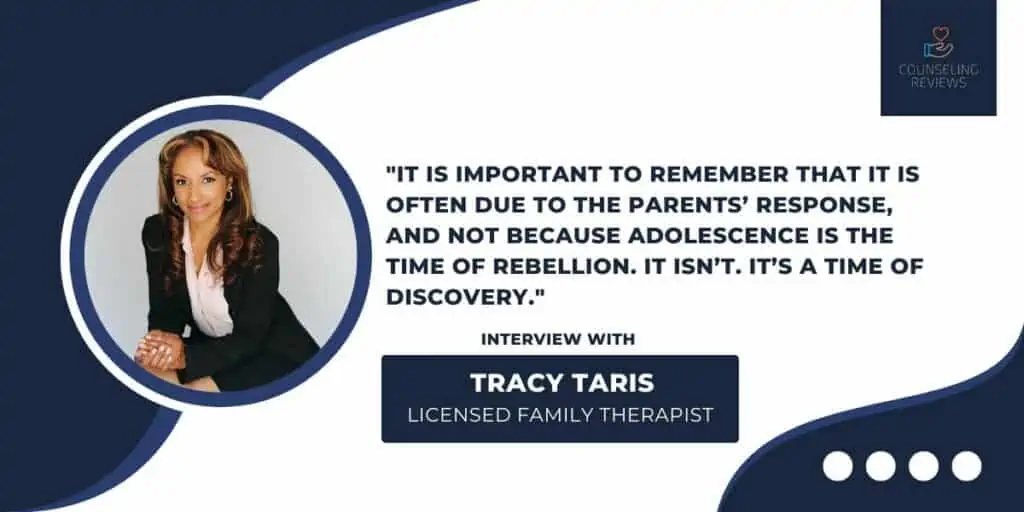Adolescence is usually difficult for both teenagers and their parents. While teenagers have to deal with mood swings, peer pressure, and wade through their search for identity, parents often have to deal with the proverbial teenage angst and teenage rebellion.
However, there are many ways these difficulties can be overcome, and one of them is by seeking therapy when needed. To understand why teenagers experience difficulties and how parents can help them better, we spoke to Tracy Taris at length.
Tracy Taris is a Licensed Marriage & Family Therapist. She holds a master’s degree in Clinical Psychology with an emphasis in Marriage & Family Therapy from Azusa Pacific University.
Tracy completed her service as the President for the Santa Clarita Valley California Association of Marriage & Family Therapists Chapter.
She is also a writer and has contributed to The Signal Newspaper. She has held workshops in the City of Santa Clarita through the Seasons Catalog and maintains a private practice as well.

1. Could you tell us a little bit about your professional background?
I am the president and owner of Healing the Mind & Spirit, Inc. where I lead a team of counselors.
My group practice is in the Santa Clarita Valley where psychotherapeutic services are provided in the form of couples, family, individual, adolescent and child therapies.
I also offer coaching services on a variety of topics from creative blocks, nutritional problems, and women’s issues.
My service to the Santa Clarita Valley also includes work as a Contract Therapist for College of The Canyons’ (COC) Student Health and Wellness Center. I am part of a team of therapists who provide therapy to students at COC.
2. What challenges do teenagers encounter?
Teens are in the psycho-social developmental stage of Identity vs. Role Confusion. It’s a journey they need to figure out for themselves, but with their parents’ or other adult’s help.
Unfortunately for rebellious teens, they look to their peers for the answer to this. The reason it can be unfortunate is because their peers are trying to figure out the same task and may not have the best answers.
This is why many parents experience the teen years as “rebellious.” It is important to remember that it is often due to the parents’ response, and not because adolescence is the time of adolescent rebellion. It isn’t. It’s a time of discovery.
When I work with parents, I often encourage them to take the stance of curiosity instead of judgment.
Teenagers usually operate from the emotion-inducing part of the brain, the limbic system. That’s ok, but I encourage them to spend some to develop logical thinking skills as a brain development as well.
Getting a teen to think for themselves helps them to figure out the question of “who am I apart from who my parents say I am.”
I also help parents begin their own process of accepting the teen for who they are, not who they, the parents want them to be.

3. Why do parents and teenagers find it difficult to understand each other?
One of the reasons why parents have trouble with teenagers is because they do not understand the stages of parenting. Parents should carefully understand their role in each stage and behave accordingly.
Stage 1: Commander (birth to about 5 or 6) – This is the stage when parents “tell” the child what to do. Today’s parents don’t like this for various reasons, mostly due to the negative connotation the word “command” has in our culture.
Infants grow into toddlers, and then into children. They have to be told, because they don’t know. However, parents can be kind and affirming when telling them.
Life is a process of learning and parents need to learn that in the first few years of a child’s life, they need to lead. During the process of leading, parents must expect that their child will follow. If they don’t develop that expectation, children will grow up not following anything
Some will, depending on the child’s personality, while others will do whatever they want regardless of what parents say. That rebellious behavior may be cute at 2 but it’s terrible at 15.
Stage 2: Coach (elementary school to teen years) – This is when parents show children how to do something and then correct them if they are wrong. When they do things correctly, they may be praised, but only if it is warranted.
Confidence doesn’t come from unwarranted praise. It comes from the ability to do something right and to know you have mastered or are mastering something.
Confidence is like a muscle. It must be earned through learning, use, and practice. In short, during this stage, parents act like coaches who build confidence in their clients.
Stage 3: Counselor (teen years) – This is where parents must ask the questions instead of trying to correct teenagers or giving advice. Parents must give them an opportunity to talk, think and plan it out before acting.
Even if parents know the answer, they should give young adults in their teens an opportunity to figure things out. They may have a different and even better way of thinking and arriving at solutions. However, you can always gently guide them if there is a need to.
Stage 4: Confidante (early adult years and on) – Once a child grows into an adult, they will desire their parents to be like confidantes or friends.
If you have kept them primarily safe during their rebellious teen years (making them feel heard, respected, and validated, etc.) and prior stages, they’ll want that in their adult years.
They’ll be drawn to people who provide respect, love, and validation in their adult relationships. People gravitate toward what they are used to, not so much what they want or think they want.
If you want your kids to choose affirming relationships that are good for them in their adult years, be that for them throughout their earlier years, and well into their adulthood.
4. Before Pandemic, what were the most common challenges you were facing with teens?
Many of the same issues I see in teenage brain now were present before the pandemic as well. Teenagers still face difficulties figuring out who they are and who they want to be.
They experience lonelinessstress, anxiety, depression, and isolation. The pandemic exacerbated these and other issues that teens face.
Although loneliness has been exacerbated due to mandated isolation protocols, teens have had a hard time before the pandemic too.
Helping teens navigate issues or getting them to a professional to find help is paramount to their development and success in getting to the next stage of life – adulthood.
5. What can you advise to parents with post pandemic teens problems?
My advice to parents is simple – Reach out for help either in your community, extended family, or seek professional help. Don’t try to do it alone.
As parents we have too many of our own insecurities about parenting to do it without community support.
Parents second-guess themselves a lot. Sometimes when a teen feels “not good enough” some of that may be a projection of what the parent is feeling.
Teens and children are like sponges. They soak up what they see, and they soak up what they can’t see, what they aren’t even aware of.
So, getting help for yourself before or while helping them, benefits you both in the long run. This also includes parents seeking psychotherapeutic care for themselves.
6. What is the best therapy teens can get?
A good therapist for a teen is one who demonstrates “unconditional positive regard,” – accepting the teen for who they are, and giving them assistance for mutually agreed goals.
There are different schools of thought or kinds of therapy available. All of which can be good, depending on the teen, what’s going on with the teen and on the professional. The top three I tend to use with most teens are:
Family Systems Therapy – The family doesn’t have to be present. We talk about family dynamics, and I help the teen to understand the dynamics in order to show where his/her responsibility lies and what they can do about it.
I also help them see where the responsibility belongs to someone else, and how to communicate with that person. I teach them how to let it go and/or set boundaries with themselves and with that person.
Cognitive Behavior Therapy – “Cognitive” refers to a person’s cognitions, or how they think. “Behavior” refers to the behaviors that are chosen as a result of what the person is thinking.
I provide psychoeducation on how this all works together, and I empower the teen to be more mindful of what they are thinking and give them tools to change those thoughts into something true (if what they are thinking is not based on evidence).
I help them arrive at an alternative perspective, or something useful. It’s important to note that this is not about positive thinking. You can think positively about something, and it’ll bring relief. But that relief is only momentary.
Narrative Therapy – It revolves around unpacking the story the teen is telling themselves and looking for other components that may have been going on at the time of the event when the story takes place.
Then, we deconstruct the elements of the story and associate it with how the teen feels, and rewrite what they want the story to be. I use all of these forms of therapy with adults as well.

Understand Your Role As a Parent to Help Your Teen Better
Adolescence can be confusing not only for teenagers but also for their parents. If you have a teen who is facing difficulties, understand that you can be a powerful source of support and guidance.
Display unconditional positive regard and urge your teen to share their problems. If you sense something amiss, there is always professional help available. It is important to seek professional help alongside community-based intervention strategies.
There are a number of therapies that can help your teen to wade through their problems. From family systems therapy to cognitive behavior therapy and narrative therapy.
All kinds of talk therapy can help teenagers overcome their issues. Most importantly, as a parent, you should seek therapy too, so that any unresolved issues can be addressed before they influence your teenager.





